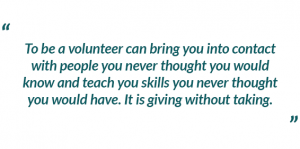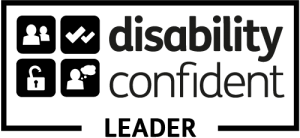Volunteering: One Step to Success
Our Employment Preparation Service
At Enable, we see volunteering as a crucial step in a person’s employment. We work with people we support with paid employment in mind as our goal, so we encourage our clients to think of volunteering and unpaid work as a steppingstone in their careers. Our Employment Officer Mireille is here to talk about what we call the pre-employment stage from her years-long experience working with our Learning Disabilities team.
The benefits of volunteering are plenty. To highlight a few:
- Volunteering builds connections
- Volunteering can challenge you to look for other ways to do things
- Volunteering is good for your body and mind
- Volunteering can give useful work experience
- Volunteering can bring fulfilment to your life
 A common sentiment we get is individuals asking why they should work if it’s unpaid. At Enable, we place clients in voluntary placements with paid employment in mind. We see volunteering as an opportunity to explore what people can do, what their affinities and interests are, as well as a way to upskill people. It is a fantastic non-pressured opportunity to explore and practise skills that are important in the workplace. Such as teamwork, communication, problem solving, planning, managing tasks and organising.
A common sentiment we get is individuals asking why they should work if it’s unpaid. At Enable, we place clients in voluntary placements with paid employment in mind. We see volunteering as an opportunity to explore what people can do, what their affinities and interests are, as well as a way to upskill people. It is a fantastic non-pressured opportunity to explore and practise skills that are important in the workplace. Such as teamwork, communication, problem solving, planning, managing tasks and organising.
We are all different; some of us are outgoing and confident. Others are shyer and find it hard to meet new people, let alone talk to them. When we set up a voluntary placement, we will always do our best to identify the needs of the client. We will do our outmost to match the culture at the placement with the personality of the client. With consent of the volunteer we will set up an individual development plan which we share with the employer. This plan can include for a person to gain the confidence to work individually, or to tend to people in the shop, to be on time, to interact with others, etc.
Working With Our Clients
 Working in a voluntary job, unpaid, does not mean you will only learn basic skills. Many voluntary places offer good training to their volunteers. One of my clients, with Down Syndrome, works in a charity shop. He started off pricing new items for the shop and now, with support and training, he is confident and able to run the shop on his own for one day a week. This is such a fantastic achievement to him, and it has boosted his self- esteem and future work opportunities. And on top of that, he feels great about himself.
Working in a voluntary job, unpaid, does not mean you will only learn basic skills. Many voluntary places offer good training to their volunteers. One of my clients, with Down Syndrome, works in a charity shop. He started off pricing new items for the shop and now, with support and training, he is confident and able to run the shop on his own for one day a week. This is such a fantastic achievement to him, and it has boosted his self- esteem and future work opportunities. And on top of that, he feels great about himself.
As we are a supported employment service, we are confronted with the challenges our clients face. After all the years that I have been an employment officer, I am still humbled by the positive attitudes and perseverance of the people I support. We all have our personal challenges in life, imagine those and a disability and/or mental illness on top. I am sure you can visualise how important it is to offer support and spread awareness about physical and mental needs. Surely it is possible to live in a society, and communities, where there is a place and acceptance for all.
Some of our clients have gained so much from their time volunteering. Helen discovered a new-found happiness in her volunteering work. Joe made great strides in his career after discover more about himself during his time doing charity work.
Mireille, LD Employment Officer









